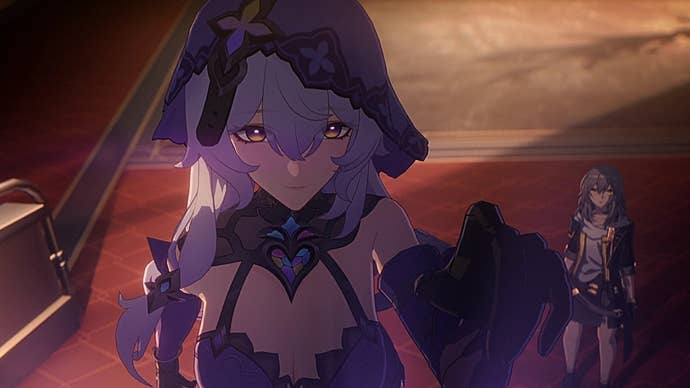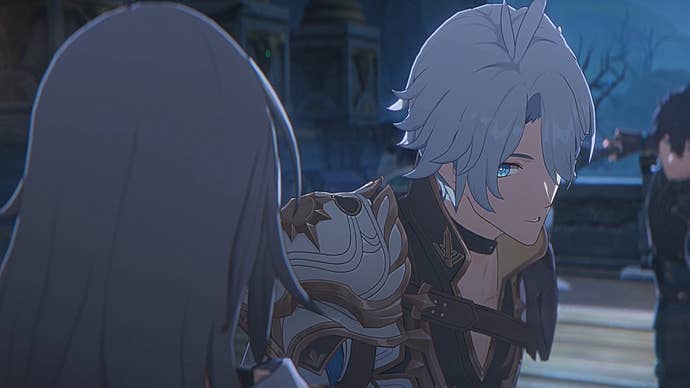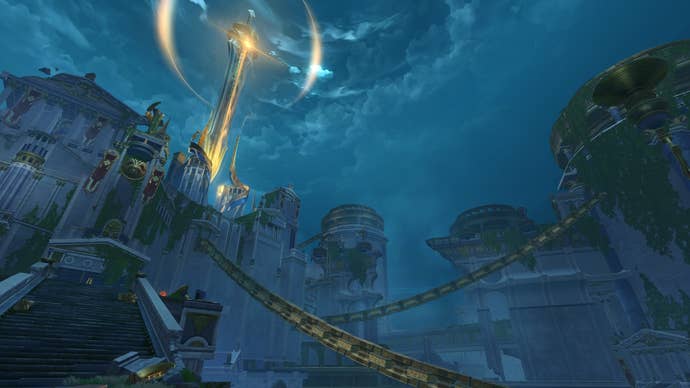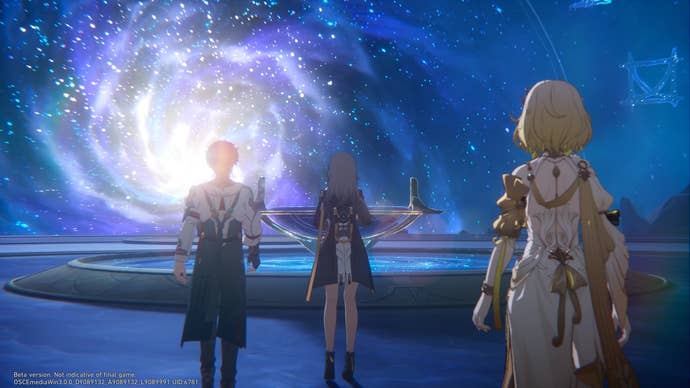There’s a lot going on in Honkai Star Rail 3.0. Tales of gods, mortals, and monsters; a brand-new battle path; a big, beautiful planet; a ridiculous number of banners; and a fresh cast of extremely suspect characters with unclear motivations. I’ve spent the past week ahead of the version’s launch seeing what HoYoverse has in store, and while some of the game’s worst aspects remain unchanged, HSR 3.0 is a thoughtful and exciting first step on this year’s new journey.
This time, the Astral Express heads to Amphoreus, HoYoverse’s overt take on ancient Greece, birthplace of democracy, or so the Greek historians tell us. We only have their words as evidence for that claim, that democratic philosophy sprang out of the Greek mind fully formed with no input from others. Saying that isn’t just some wanky attempt at sounding big-brained, either. The malleable nature of history, the lies we believe and tell to further our interests, and the way leaders weaponize storytelling and faith to pursue their agendas – all these are at the center of HSR 3.0’s story.

After an unexpected crash landing on Amphoreus, the Trailblazer and Dan Heng find themselves in the middle of a conflict. Statues come to life and attack a group of refugees, before a white-haired swordsman named Phainon – that’s Greek-pilled Kevin to anyone who played Honkai Impact 3rd – and a small child named Tribbie rescue everyone and promise to take them to safety. The refugees refuse to go, insisting they’ll follow their gods and traditions and find safety alone, until Phainon convinces them that he and Tribbie are Chrysos Heirs.
In Amphoreus lore, Chrysos Heirs inherited the gods’ golden blood and are destined to overthrow the Titans and establish themselves as the world’s new gods. In this hierarchy, that little fact means the refugees have to trust Phainon or risk betraying their faith. The right words and a little manipulation are all it took for Phainon to bend a whole group to his will.
It’s for the better, though – at least, this time it is. Phainon and the other Heirs openly admit they rely on people’s faith in them, the Titans, and the existing social order to keep things under control, and they aren’t above lying to them or abusing that faith to keep things the way they want. Otherwise, with the end of the world supposedly approaching, chaos could engulf the planet. The thing is, even the Heirs don’t fully know why they’re doing this. They just have some old prophecy to go by, an ancient set of words of unknown provenance and unknowable intent that drives them to act.
This order the Heirs built has an undercurrent of inequality running through Okhema. Citizens, in a very ancient Greek way, justify excluding others on the basis of where they were born or who they believed in. None but a few are allowed to know the city’s true history. Everyone else gets a heavily censored version designed to inspire pride in their shared culture and belief in the Heirs. When the Trailblazer goes to meet Aglaea in a ritzy area exclusively reserved for the Heirs, even the in-game narration comments on how regular people don’t have it as good.
All this is an effort at deconstructing the idea of a hero, whether that’s an epic one of legend or a modern one in whatever form they might take, be it politician, influencer, or celebrity. It quietly picks apart the forces that create heroes and how the heroes themselves are often behind those forces, while poking at the role of myths in maintaining ideals that shouldn’t be maintained. A hero’s existence in real life and in HSR relies on them having ordinary people to save, which requires a persistant equality gap and encourages devotion to people who need that adoration for a sense of identity, but feel no obligation to love and care for the people offering it up.

That all this happens in a setting inspired by ancient Greece is a delicious extra bit of irony. Amphoreus is built on that inequality, a state of affairs no one questions, as they’re told by stories, their faith, and even their love of country that this is the way things should be – and the Chrysos Heirs certainly aren’t going to disabuse them of that notion, not with godhood up for grabs. Whether saving the world justifies the actions they take to fulfill their goals or even if the society they create will help others and not just themselves – that’s another matter.
HoYoverse has a knack for making its least likeable characters tragically good in the end, or at least sympathetically tragic, as they did with Aventurine and Sunday. As the Trailblazer’s goal is helping the Chrysos Heirs overthrow their gods, it seems likely the Heirs will turn out to be victims themselves in the end, hopefully after realizing it’s not nice to step on the little people to get what you want, even if you are a hero. Still, whether everyone ends up nice for reasons later on or not, it’s a deeper, timelier, and more thoughtful follow-up to Star Rail 2.0’s critique of escapism and capitalism.
Amphoreus isn’t all highbrow serious stuff, though. HSR 3.0 made me laugh out loud several times, like when I had the Trailblazer eat dirt to spite a dinosaur or when I realized a talking stone lion who spreads rumors was meant to be like Twitter’s trending topics section. It’s got tender moments, trash cans, snark, plenty of fourth-wall-breaking moments – basically all the good parts of Honkai Star Rail, only better than usual.
And some of the bad parts, too. The conflicts in Amphoreus are far more interesting than the place itself, which, aside from looking beautiful, is often dull to explore. Not that it’s empty. Hub areas such as Okhema feel alive and layered like an actual town. Quests pop up naturally, as the Trailblazer overhears conversations or gets roped into people’s problems, and minor events unrelated to the story play out when they speak to certain characters, such as shopkeepers, for the first time.

But everything is just a little too frictionless outside of endgame challenge modes. Conversation choices still don’t matter, even the really big ones that seem like they should. Puzzle designs are basic. Heck, one of them is basically just a captcha test that has you rotate orbs until a clear picture forms. Dungeon-like areas have multiple paths through now, but there’s no way to get lost. The new Remembrance power of rewinding time to fix or move objects seems like a gimmick and rarely shows up in ways that don’t feel overly simplistic or forced. After two years of improvements and expansions, HoYoverse needs to start giving some thought to making all the moments between story beats and setpiece battles more interesting.
Speaking of battles, Honkai Star Rail 3.0’s meta seems designed to give older characters another shot at usefulness, instead of powercreeping them into obscurity. Enemies on Amphoreus have armor, which gradually decreases in strength as they take more hits from the party. This armor is separate from the toughness meter, though breaking armor means enemies take more damage for a short time.
The idea is to hit as many foes as possible each turn. Erudition characters, including Himeko and HSR 3.0’s new character The Herta, are perfectly suited for this, marking the first time they’re viable for anything outside of Pure Fiction. However, it also means pretty much every other character is suddenly useful again, except maybe Seele. Looks like you’re still stuck at the orphanage, kiddo.

Follow-up attackers reduce enemy armor counts by one additional point, which makes Jade and even Bounce and single-target attackers like Aventurine and Moze more useful now. Lingsha and Gallagher’s party-wide attacks have new importance. Hunt characters aren’t left out, either, as elite and boss enemies often have special armor that’s easier to wear down with fast, single-target units.
The Trailblazer’s new Remembrance form is perhaps slightly less powerful than Harmony Trailblazer, but is far more useful than their first two iterations or any of the player character forms in Genshin Impact. Powercreep is bound to happen at some point, possibly sooner than later, if Mydei’s Blade-like kit is anything to go by. For now, though, it feels fair and balanced, and armor adds a welcome extra layer of strategy to battles.
Aside from all the tired bits that HoYoverse seriously needs to address at some point, Honkai Star Rail 3.0 is a confident first step on this new journey. It sets up plenty of opportunities for growth as well, both in the main story, as the party helps each Heir topple their respective god, and in how its characters interact with each other and have lives that don’t revolve around the Trailblazer.











Add comment